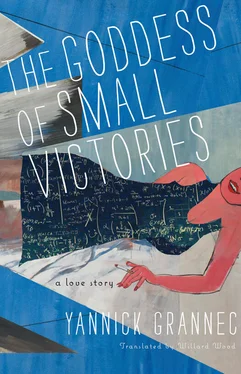“If mathematical inspiration can come from pizza, why not from Mallarmé?”
Calvin Adams appeared in the doorway. He had the look of a man who discovers that the real party has been happening elsewhere, without him.
“These youngsters have been monopolizing your time, Pierre.”
“Not at all. Frenchmen always wind up in the kitchen.”
Calvin apologized for calling him away from the charms of the lovely Ernestine; they needed to make some final arrangements for the conference scheduled two days hence. Pierre Sicozzi rose regretfully to his feet. He courteously kissed the two women’s hands and gave a warm handshake to Leonard, who responded with the barest courtesy. Calvin put his arm around his son’s shoulder and asked him to say a few polite words to the Richardson heir. Leo tore a page from his notebook, scribbled down a number, and handed it without a word to Anna. She put the paper in her handbag, promising herself not to make use of it. He hadn’t changed one iota, and a certain dead mathematician was adding enough complexity to her life at the moment.
With the pantry returned to its normal, comfortable silence, Tine poured herself a tiny glass of punch, then lit a cigarette. It was time for Anna to go home. Ernestine pressed a Tupperware container on her that there was no question of refusing, then suffocatingly mashed her to her enormous bosom. She whispered in Anna’s ear, “ Appelle-le, crétine! ” Call him, you idiot!
When the door closed on the last of his guests, Calvin reentered his personal hell; Virginia was pouring herself a gin with only approximate command of the trajectory.
“You want to have them mate? Anna is a pale copy of Rachel. You’ll have grandchildren as white as a daikon radish, with their father’s big nose. Where shall I make reservations for the bar mitzvah?”
“You’re not making any sense.”
She jiggled the ice in her glass.
“I’m perfectly lucid. You have always had a thing for her mother.”
“From what I see, you are becoming lucid earlier and earlier in the day, Virginia.”
46. 1958: Papa Albert’s Dead and Gone
Dear Posterity,
If you have not become more just, more peaceful, and generally more rational than we are (or were) — why then, the Devil take you. Having, with all respect, given utterance to this pious wish, I am (or was) Yours, Albert Einstein
— message written for a time capsule
I walked around our yard looking for a place to put my new purchase: a pink flamingo made of painted cement. Kurt watched my movements from his deck chair. Despite the mild spring temperatures, he still kept his overcoat, wrapped his legs in a plaid blanket, and, in a recent mania, wore a woolen balaclava. From the steps, I spied the perfect place: next to the arbor, where the loud pink would clash wonderfully with the green of the lawn and the delicate red of my camellias. I set my trophy in place and stepped back to admire the effect: it was impossible to miss this incongruous object. I savored in advance the silent disapproval of Kurt’s mother. See what a woman of mediocre taste can accomplish, Marianne .
“My mother is not going to like that oddity.”
“Your mother will just have to put up with it. I like it!”
“She’s already not too pleased at having to stay at the hotel.”
“We have no choice. You couldn’t ask your mother and brother to sleep on the living room couch!”
“I don’t think it’s very elegant, asking my family to pay for a hotel on their first visit to Princeton.”
“What about the money you send them every month? Even though your brother makes a good living!”
“Your mother lives with us. But mine can’t even spend a few nights at our house.”
“Why don’t you offer to pay for your mother’s hotel room? Your brother can perfectly well afford it!”
Eighteen years had passed since we had left Vienna, and Marianne and Rudolf were finally agreeing to visit Princeton. Thrilled at the prospect of rediscovering his family, and relieved not to have to travel to Europe himself, Kurt was worried there might be a renewal of family hostilities. He couldn’t understand my resentment toward them; he had never understood the first thing about other people’s feelings. I had promised to be on my best behavior: I would feed them amply and walk them around Princeton with a smile. As long as she didn’t pick on me! I had to admit that Kurt never reproached me for the money I spent on travel or for having to give my mother a place to stay. But in this our hands were tied: I couldn’t let her die alone in a hospice. And she couldn’t find her way from the bedroom to the kitchen. I often had to rescue her in extremis from the street; she thought she was still on the Lange Gasse.
“What a shame that my mother never had a chance to meet Albert! I would so have loved to introduce them. They were the same age.”
I went and kneeled beside him.
“Would you like a nice cup of hot tea? You look petrified with cold.”
“Did you remember to order the meat for tonight? My mother loves veal.”
We were counting our dead. Papa Albert had already died three years before. The news from Europe was that Pauli was dying in a Swiss hospital. 56Earlier in the year, cancer had drained the last of John von Neumann’s gigantic life force. 57At his funeral service at the Princeton cemetery, I remembered Albert’s terrible joke about the three nuclear physicists who are told they are going to die. Each would be granted a last wish. What had John asked for? Not to meet Jean Harlow, not to see the president, not even for a second opinion; he had insisted on pursuing his research. He had had himself transported to the lab on a stretcher. What had Einstein asked for? Peace. In a letter to Bertrand Russell, he agreed to sign a new petition urging every nation to renounce nuclear weapons. In the hospital, laid low by an aneurysm, he had made Bruria bring him the papers on his desk. He had written: “Political passions, once they have been fanned into flame, exact their victims.” Protesting, warning, working, researching. Fighting until his last breath.
I sometimes wondered what my husband’s last wish would be. I worried that he wouldn’t last much longer. With Albert gone, Kurt had become imprisoned by his loneliness. Oskar Morgenstern and Robert Oppenheimer, even if they were still there to support him, had forward-looking lives; they had children, projects. Although Kurt knew and socialized with a few other logicians — Menger, Kreisel, and the young Hao Wang, whom he particularly liked — my husband was of a different species from most, a white tiger among lions. Albert had been one of the few to speak his language. Kurt was a stranger — a stranger to this century and to this world. A stranger even to his own body.
“Do you want me to bring you the New York Times ?”
“I have to fill out these grant applications. Administrative duties are weighing me down. And I have an article on recursive functions to finish.”
“All that can wait.”
“I’m already late.”
“As usual.”
“Last night I stopped in front of Albert’s office in Fuld Hall. It hasn’t been reassigned yet.”
“No one dares to. But life goes on.”
Kurt got out his box of medications. He lined up on the tray at least ten pills, then swallowed them with a swig of milk of magnesia. Under his blanket, he looked like a mummy, an ageless body. I sat down beside him with my sewing. Penny tried to grab a ball of yarn from my work basket.
“The tea is too strong. They haven’t called yet?”
I looked at my watch.
“Their airplane has only just landed. Give them time to disembark.”
“They’ve taken the first step. Now they’ll be able to come back more often.”
Читать дальше












